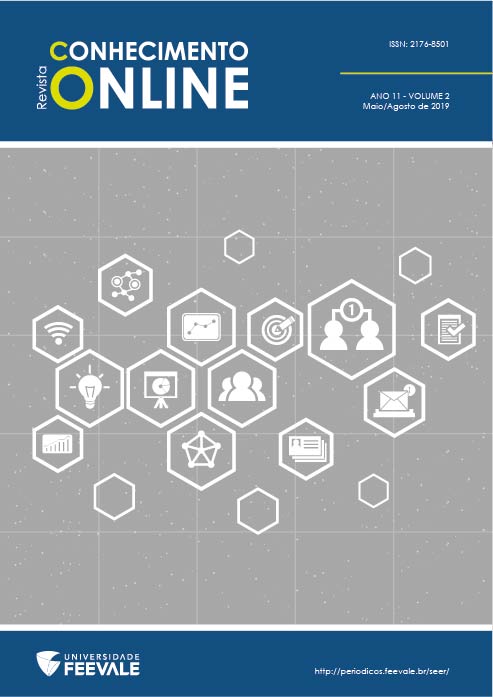O PAPEL DAS ESTÓRIAS INFANTIS NO DESENVOLVIMENTO DA LINGUAGEM EM CRIANÇAS E ADOLESCENTES COM SÍNDROME DE DOWN
DOI:
https://doi.org/10.25112/rco.v2i0.1702Palavras-chave:
Síndrome de Down. Discurso narrativo. Linguagem.Resumo
O presente estudo propõe estimular o desenvolvimento da linguagem por meio das narrativas infantis em crianças e adolescentes com Síndrome de Down (SD), além de identificar as fases do desenvolvimento do discurso narrativo em que cada indivíduo se encontra. O presente artigo tem pressupostos teórico-metodológicos da Neurolinguística Discursiva (ND), com caráter transversal e de cunho qualitativo. Os participantes foram selecionados no Laboratório de Estudos e Pesquisa em Neurolinguística (LAPEN), localizado na Universidade Estadual da Bahia (UESB) em Vitória da Conquista - Bahia, sendo 4 crianças/pré-adolescentes com SD, do sexo feminino, com idade entre 8 e 12 anos. A intervenção seguiu-se com um total de 9 encontros semanais de maneira individual com cada participante, em uma sala reservada no LAPEN, com duração de 30 minutos. Em cada sessão, foram realizadas 3 etapas: contagem, atividade distratora e recontagem. O período das intervenções foi entre os meses de agosto/2016 a fevereiro/2017. Para a análise de dados, as intervenções realizadas foram filmadas, transcritas e categorizadas. A categorização do discurso narrativo foi feita utilizando as três fases do desenvolvimento propostas por Perroni (1992): Protonarrativa, Narrativa Primitiva e Narrativa. Os resultados evidenciaram que as crianças e pré-adolescentes com SD encontram-se em fases distintas do desenvolvimento do discurso narrativo, não sendo relacionado com a idade cronológica e nem com a idade de início das intervenções na linguagem. Além disso, a estimulação através de histórias infantis propiciou o desenvolvimento do discurso narrativo, que acarreta em um melhor desempenho linguístico e oportuniza o uso da linguagem para diferentes contextos.
Palavras-chave: Síndrome de Down. Discurso narrativo. Linguagem.
ABSTRACT
The present study proposes to stimulate the development of language through children’s narratives in children and adolescents with Down Syndrome (SD), as well as to identify the phases of the development of the narrative discourse in which each individual is. The present article has theoretical and methodological assumptions of the Discursive Neurolinguistic (ND), with transversal character and qualitative character. The participants were selected from the Laboratory of Neurolinguistic Studies and Research (LAPEN), located at the State University of Bahia (UESB) in Vitória da Conquista - Bahia, with four children / pre-adolescents with SD, female, aged 8 and 12 years. The intervention was followed by a total of 9 weekly meetings individually with each participant, in a room reserved in LAPEN, lasting 30 minutes. In each session, 3 steps were performed: counting, distracting activity and recounting. The period of the interventions was between the months of August / 2016 to February / 2017. For data analysis, the interventions were filmed, transcribed and categorized. The categorization of narrative discourse was made using the three phases of development proposed by Perroni (1992): Protonarrativa, Primitive Narrative and Narrative. The results showed that children and pre-adolescents with DS are at different stages of the development of narrative discourse, not related to the chronological age or the age of onset of speech interventions. In addition, stimulation through children’s stories led to the development of narrative discourse, which leads to better linguistic performance and allows the use of language for different contexts.
Keywords: Down syndrome. Narrative speech. Language.
Downloads
Publicado
Como Citar
Edição
Seção
Licença
• Os autores mantêm os direitos autorais e concedem à revista o direito de primeira publicação com o trabalho licenciado sob a Licença Creative Commons - Attribution 4.0 International (CC BY 4.0).
• Os autores são estimulados a publicar e distribuir seu trabalho online (ex.: em repositórios institucionais ou na sua página pessoal), pois isso pode aumentar o impacto e a citação do trabalho publicado.


